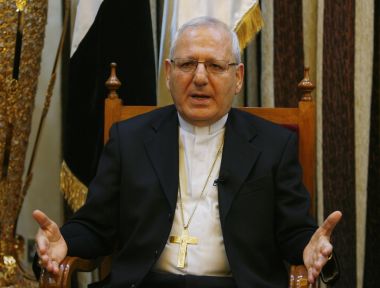Should Christians fast during Ramadan?

In the Roman Catholic Church, Friday used to be a fairly strict fast day. Protestants don't really do fasting at all, apart from on special occasions; certainly it's not tied to the liturgical year.
But how about fasting for Ramadan this Friday?
It's a suggestion made by the Chaldean Patriarch, Louis Sako, who has responsibility for the Church in Iraq, and it's been met with some bafflement and even hostility. Muslims are the enemy, the thinking goes. Why on earth would Christians want to join them? Doesn't the Patriarch know who's side he's on? This is the slippery slope to syncretism.
You don't have to agree with the critics to feel the force of the argument. Christians in Iraq have been the victims of the most thorough-going persecution for centuries. The stories make our hearts break. In Iraq, in Syria and throughout the Middle East the most ancient Churches of all are looking extinction in the face.
So isn't the answer to resist, and to draw thick black lines between "us" and "them"?
At one level, yes. But I still think what Patriarch Sako is doing is admirable. He's reaching out a hand to people of goodwill from a different religion. His statement actually says: "In solidarity with the fasting Muslims during this month of Ramadan, we will fast and pray together for peace and stability in our country and the region."
That "pray together" might cause theological hackles to rise, too. But he isn't talking about praying in the same place, just at the same time. And, as he points out, it's the Church in Iraq that – without distinguishing between Christians and Muslims – is feeding refugees, providing healthcare and even providing after-sunset 'iftar' meals for fasting Muslims.
So perhaps the message is this: there's a time to be absolutely clear about distinctives, passionately clear about what divides us – because it does.
And there's a time to park those divisions, and say: here and now, in this situation, what matters is our shared humanity. So Christians and Muslims can meet and acknowledge one another's difference, but say, "Just now, that's not the main thing."
When Muslims are killing Christians in the name of religion – and elsewhere in the world, in the Central African Republic, Christians are killing Muslims – that's really important. It sends a signal about solidarity as humans, whatever our religious differences.
There's another point at which that solidarity's been important, too. Omar Mateen killed 49 people in a gay nightclub in Orlando. And yes, there were those Christians who responded with appalling expressions of hatred – people like Pastor Steven Anderson, or Pastor Roger Jimenez, who uploaded a sermon to YoutTube in which he said it was "great" that so many gay people had died. But most Christians, no matter how they felt about homosexuality, just grieved – and that's how it should be.
It's worth noting that the Southern Baptist Convention, resolutely opposed to same-sex marriage and homosexual practice, passed this motion yesterday: "That we regard those affected by this tragedy as fellow image-bearers of God and our neighbors, and therefore condemn this act of terrorism and others like it and pray for the day when these senseless acts of violence cease."
There's a time for everything, says the Preacher in Ecclesiastes 3: "a time to scatter stones and a time to gather them, a time to embrace and a time to refrain" (verse 5).
Now, in a world with so much hatred, violence and destruction, it's surely time to build and to embrace. Fasting for one day during Ramadan might just be a start.
Follow Mark Woods on Twitter: @RevMarkWoods











